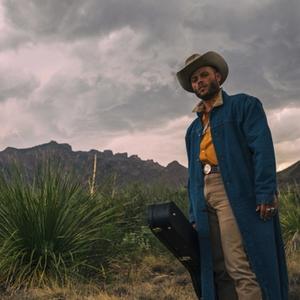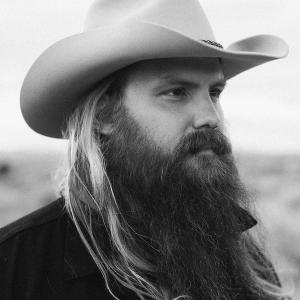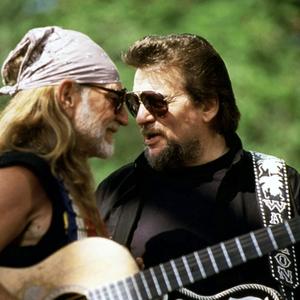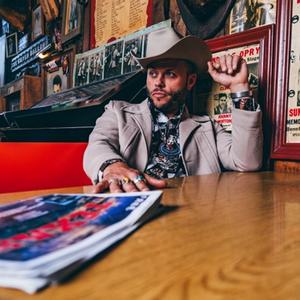
Cowboys & Cash: Charley Crockett On AI in Music, the Modern Day Traveller & the American Dream
By Holly Smith




Link copied

Most artists who hit the big time would find it hard to calculate the hours they’ve spent performing. For Charley Crockett – the San Benito, Texas native who spent decades busking on dusty street corners and playing bars at closing time before hitting the levels of success that allows one to grace the Grand Ole Opry stage – the number is truly unquantifiable.
Yet, when he steps out for the first of three sold out nights at London’s Hoxton Hall, it quickly becomes clear that you’re witnessing a one-off event.
On a quiet Monday evening in a nondescript back road of London, Crockett treats his set as an experiment. It’s a run-through of a main act that never happens, all the more intimate for the audience who feel as though they’re getting a peek behind the curtain, sitting in on a private rehearsal.
He abandons songs halfway through, declaring that they’re “not ready yet”, musing to the crowd “I don’t know what to play” before launching into tunes casually picked from his extensive repertoire and unabashedly displaying the knots in his vocals and guitar picking as he warms into the set.
This isn’t a musician in meltdown, it’s simply the humanity that Crockett brings to the stage. “I make a lot of mistakes. I’ve got a lot of flaws and I’m not the best singer, but I think people that are buying tickets know that about me,” he tells Holler backstage before the show.
It’s this audacious attitude towards the tarnish that reveals itself when a musician stands in front of a crowd that he believes will save them from the relentless march of technology on music. This conversation comes a few days after Randy Travis released new music with the help of AI and Johnny Cash has made a posthumous return more than 20 years after his death. How can musicians maintain authenticity in a world that can almost literally bring people back to life to perform?
“You can’t stop what’s coming and sometimes you feel like the harder you try, the faster it takes over,” he says, admitting to having been fooled by Hank Williams and Frank Sinatra AI recordings. “I might be convinced to go see something like [a Johnny Cash hologram], because I like the idea that Johnny Cash could still be somehow walking the earth,” he adds, “but Johnny Cash’s hologram cannot make you feel like Johnny Cash if he was standing there".
As country music evolves and reaches ever further from its home in the southern United States, the idea of what it means to make it has become increasingly fraught, yet discussions on authenticity in country music usually devolve into a series of buzzwords like “raw,” “real” or “connection”.
Crockett is characteristically unafraid to shoot straight on the topic, rejecting the idea that wearing a cowboy hat or coming from rural beginnings is an automatic free pass to claiming authenticity as a country musician. Rather, the changing commercial workings of the rural American south mirror the path of the music that comes from it.
The music may be inextricably linked to the land, but the spirit of individualism and freedom that defined cowboys of old – and the music of Crockett’s heroes like Waylon Jennings – doesn’t sit comfortably alongside the commercialisation of it. It’s Crockett’s apparent belief, in 2024, that being a true cowboy is more about an attitude and set of beliefs than it is a profession or its aesthetic associations.
“The American idea that the cowboy is a hero is from a much earlier era in a time that we called the open ranch, which was before all of that big country got fenced in and sold off. Even the modern cowboy that’s out there working cattle is dreaming of that era, but it’s all fenced in,” Crockett explains, making it clear that he doesn’t see himself as fenced in, or think that modern cowboys should see themselves in him.
“Working on a fenced in ranch is not the same as what I do. I could quit doing this and go do that. I’m an able bodied, strong man, and I’ve done that a little bit as a transient to get by working for people in rural areas… It might sound fucked up, but I can do what they do. They can’t necessarily do what I do”.
It comes back, again, to the live performance and entertainment aspect of being a working musician without a giant corporate machine behind him, needing to sell tickets to survive. A cowboy hat may make someone look the part, but the showmanship and creativity is something that can’t be bought in a store. It makes sense that Crockett would feel this way; his career has famously been built on years of street busking, hustling and relentless output, releasing 13 albums in just the last nine years alone.
He's the walking embodiment of the American dream, the idea that humble beginnings can be built into success stories via hard work and a determination to succeed. Yet on his new album, $10 Cowboy, which tells some of these stories as it looks at modern day America, he seems wary of his homeland. “America how are ya? I hope you’re doing fine / America I love ya and I fear you sometimes”, he sings, describing a life spent labouring in fields and controlled by the might of the American machine. So, does he identify with the American dream, and is there a danger of romanticising the struggle that comes with achieving it?
“America is a place where the casino that is America is rigged in favour of the house, but you can still win. Every American knows and believes that, on some level,” he says pointedly. “That’s very much what makes us American. Travelling the world, you see the darkness and the beauty in it. There’s a lot of darkness. The fact that we even get to roll the dice, I know there’s a great amount of privilege that comes at the expense of a lot of the world that we just deal with or that I’m aware of as a traveller”.
This idea of the travelling musician is a key part of the Charley Crockett story. Born in Texas, his pursuit of music has seen him find homes and street corners in New Orleans, California, New York, Paris and Morocco, amongst others. While travelling may be his badge of honour, it’s only a pin on the lapel of his proud identity as an American citizen. It’s this characteristic that he believes true authenticity in country music is inextricably linked with. “It does appear that it has everything to do with being American,” he notes. “I think even your interest in me is from me being Texan first and then an American,” he says, knowing the allure the American mythology has for the rest of the world.
Not all interest is good, though. Being an American who looks and sounds like Charley Crockett – with his Texas drawl, cowboy boots and hat – has had mixed results on the streets of the UK. He describes getting “so much shit on the street,” and even getting into physical altercations in Glasgow. “A guy decided to swing at me and he was really drunk. He got an elbow to the mouth, a big old elbow,” he laughs.
That’s Charley Crocket for you, someone who can’t be pushed or even elbowed into submission.
“I’m not fenced in,” he says. “I have not been sold off, I’m independent. I’ve got a 300-song catalogue and I own it. I’ve got people printing that I’ve sold out and I haven’t. Almost everybody else I know did sell out and they didn’t even have to do what I did before they sold their fucking farm, but I haven’t sold. I think that’s why the people who come see me like me, because they know that”.
Charley Crockett's 2024 album, $10 Cowboy, is out now via Son of Davy / Thirty Tigers.
For more on Charley Crockett, see below:





